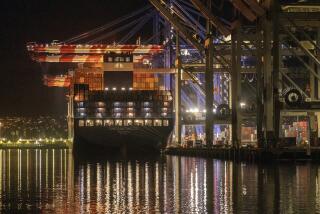COLUMN LEFT / ALEXANDER COCKBURN : Economic Pain Drives Us to Cargo Cults : From the Mall of America to the Madonna of Watsonville, miracles are elusive.
Each American town, answering the quest for symbolism that election time brings with it, offers its lesson and its portent.
On a Saturday afternoon a month ago, I stood in the new Mall of America in Bloomington, Minn., just south of the twin cities of Minneapolis-St. Paul. Itâs the largest mall in the world. No doubt archeologists of the future will excavate it as prime locus of the American dream, albeit a dream trembling with one foot in Chapter 11.
Anchored at its corners by Macyâs, Bloomingdaleâs, Nordstrom and Sears, it shelters boutiques, restaurants, cinemas and, at its heart, Camp Snoopy, a vast interior playground replete with carousels, slides and roller coaster rides.
The crowds were bustling and exuberant. âWhat recession?â I said to my friends. But after an hour or so one could see there was less commercial action than initially met the eye. As inner-city black and Latino youth larked about in the electronic arcades, watched by edgy white suburban cops, there was plenty of fear in Mall of America--fear among retailers that at present rates of business they wonât last much past Christmas. The day before, reporters from a local paper had counted shopping bags and found that only one visitor in 20 was buying something.
There was a big element of cargo cult about Mall of America--the idea that if you make it large enough and glitzy enough, consumers with real dollars in their pockets will materialize.
Three weeks later, in the mid-coast California town of Watsonville, I saw the cargo cult in action once again.
This is a farm town hit hard by the stateâs economic crunch and an international economy taking jobs south. Three-thousand out of 6,000 cannery jobs have gone in the last 10 years, and farm wages are lower now than they were in 1980. Half of all new babies and 70% of Latino babies are born into poverty. Working people live in garages, tool sheds and their cars and campers. Official unemployment is in double digits. There are long lines outside the local food banks.
Watsonville was badly hit by the Loma Prieta earthquake of 1989. The biggest chunk of earthquake recovery money that came to Watsonville was a $24-million low-interest loan to rebuild Fordâs department store on Main Street downtown. Other major public funds were devoted to a new three-story parking garage nearby. Thus did the cargo cultists set the stage for luring in the miraculous BMWs roaring down Route 1. The new Fordâs was also designed with virtually no ground floor windows. Who needs the poor folk of Watsonville peeking in at the displays?
The sad joke is that there was plenty of parking space in downtown Watsonville and the people likely to buy things in Fordâs (now bankrupt after less than a year in business) are those who live in town rather than the imaginary consumers in those BMWs from San Jose or Monterey on whom the City Fathers remain fixated.
From cargo cult to miracle. On June 17 of this year, Anita Contreras Mendoza was walking by Pinto Lake in a town park just outside Watsonville. Sheâs been in the habit of doing this ever since one of her grandchildren drowned in the lake.
To Anita appeared the Virgin of Guadalupe, borne on a seashell, dressed as a farm worker, âuna campesina valiente,â as Anita later put it. Anita talked with the image but doubted her senses until, looking up at the main branch of a California live oak in the ancient grove, she saw, dark wood amid light bark, the famous outline of the Virgin of Guadalupeâs mantle.
Thousands have visited the site. A modest chain-link fence now protects the tree itself, decorated with flowers, photographs, prayers and even a button of Joe Montana. On a Tuesday mid-morning there were some dozen visitors praying, using mirrors to catch the sun and thus illuminate the dark shape 20 feet up.
Miracles and apparitions tend to cluster in hard times, uplifting the soul of a soulless world. In the 1985 cannery strike, Anita was one of the leaders of the successful wildcat action that enabled the Teamster local to survive a union-busting attempt. Back then, Anita said: âTo stop now would be giving up. As long as God is in his Heaven I will never give up.â
But now the canneryâs owner, a London-based multinational company called Grand Metropolitan, has shifted much of the processing to Mexico. The buoyancy of the strike victory has long disappeared. Fordâs stands bankrupt as cars head down Main Street and out to the shores of Pinto Lake for a miracle far older than the BMWs that never came.
More to Read
Inside the business of entertainment
The Wide Shot brings you news, analysis and insights on everything from streaming wars to production â and what it all means for the future.
You may occasionally receive promotional content from the Los Angeles Times.







